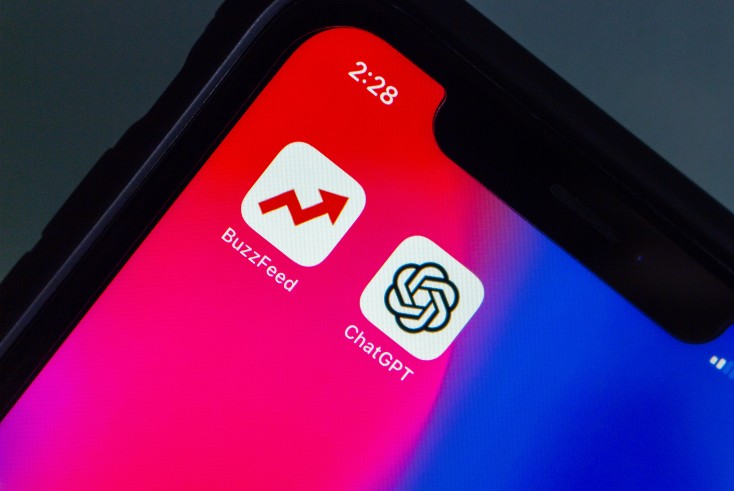Can AI-generated content save publishers like BuzzFeed?

BuzzFeed’s revenues declined 27% year-on-year to $77.9m, the online publisher announced in its second quarter earnings release yesterday.
That includes a 33% decline in advertising revenue to $35.4m.
The company’s net loss totalled $27.8m and its adjusted Ebitda (a measure of profit) was a loss of $0.1m, compared to $2.1m in Q2 2022.
Why PinkNews sees a big future as Vice and BuzzFeed News falter
Analysis: Where is the competitive advantage in AI?
The increasingly dire financial straits at BuzzFeed come as users’ time spent on the site declined 9% year-on-year.
It has been a difficult past year for BuzzFeed, which has been negatively affected by social sites like Facebook shifting away from news recommendation and toward short form video. The company laid off 12% of its staff in December before shutting down the Pulitzer Prize-winning outlet BuzzFeed News altogether in April.
Shares of BuzzFeed are down 94% since its initial public offering in December 2021.
In the company’s earnings release, BuzzFeed CEO Jonah Peretti attributed the decline in readership to “consolidation and share gains across the major platforms that continue to impact audience traffic” and said that the publisher is therefore “laser focused” on weaning itself off its reliance on social media networks for traffic.
To do so, Peretti reiterated how BuzzFeed will seek to leverage AI for content creation.
“We have introduced new AI-assisted content formats to increase engagement and offer innovative advertising opportunities to our clients,” he said. BuzzFeed is also expanding its creator network “to participate in the rise of vertical video” and seeking to grow its HuffPost homepage audience through prioritizing “destination news content.”
Other publishers, such as the UK’s largest publisher Reach, have previously announced they are exploring using AI for content creation. Larger entertainment conglomerates like Disney have also created task forces to study how AI can be applied across its properties. But BuzzFeed has thus far been among the most outspoken in describing how it will develop an AI-supported content strategy.
“Over the next few years, generative AI will replace the majority of static content, and audiences will begin to expect all content to be curated and dynamic with embedded intelligence,” Peretti told investors in April.
Yet it is entirely unclear whether AI-created content can be so good as to drive more traffic to BuzzFeed’s properties, especially when BuzzFeed’s content production doesn’t really have a moat. That is, any content you could find on BuzzFeed, you could probably find it elsewhere by competitors, including on social platforms or other more reputable news outlets.
AI seems unlikely to solve this problem; rather, it could make it worse. For example, The Media Leader asked ChatGPT to “create a BuzzFeed-style quiz and article asking: which Succession character are you?” and within seconds it spit out an article just as good as the content historically on offer on BuzzFeed. It drew up five generic questions like “How do you handle conflict?” and “What’s your ideal weekend activity” and supplied answer options A through D, and depending on which answers the user selected, they could either be Logan, Siobhan, Roman, or Kendall Roy.

“Whether you’re a fierce leader like Logan, a smooth operator like Shiv, a quick-witted jester like Roman, or a conflicted soul like Kendall, remember that every character brings a unique flavour to the Succession saga,” it wrote. “Embrace your inner Roy and enjoy the journey!”
The obvious issue this brings for BuzzFeed, especially if it is to further leverage AI for creating content, is that anyone can make this cookie-cutter content through using AI tools. In other words, unless the employees at BuzzFeed are significantly better at using AI than the average person, there’s no competitive advantage to be had here.
After all, when anyone can create a BuzzFeed-quality quiz or article, why would anyone still go to BuzzFeed?
The implication is just the same for any major publisher considering the use of AI for direct content creation. Sure, you can create more content using fewer resources, but any such content is necessarily not unique.
With BuzzFeed’s financial failures as proof that an exclusively ad-funded business model for online publishers is no longer sufficient to grow revenues, some form of a subscription-based model is likely a necessity. But if users are paying good money for content, they will likely expect more than whatever ChatGPT can spit out.




